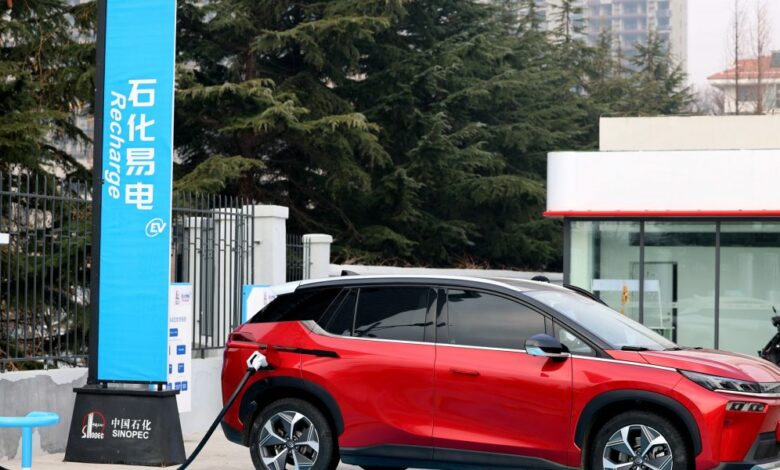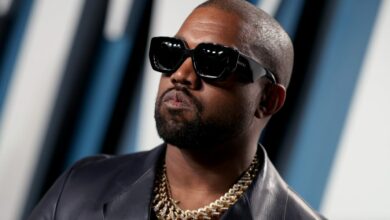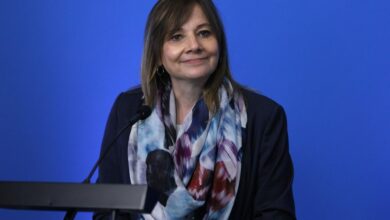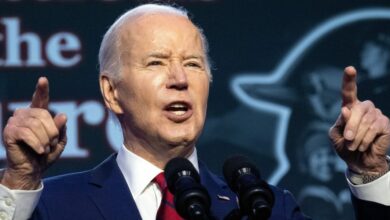Li Auto, BYD and Nio, on Fortune/BCG’s Asia Future 30, poised for future growth

China is the world’s largest EV market—and the most competitive. Sales of “new energy vehicles,” which includes both hybrids and battery EVs, expanded by 38% last year to reach 9.49 million units, according to data from the China Association of Automobile Manufacturers. If the global market for EVs was 13.6 million last year, as research firm Rho Motion estimates, then China is responsible for almost 70% of all EV sales last year.
As the world embraces electric vehicles, China’s affordable EVs could be poised for global dominance—a possible future that worries both legacy automakers and Tesla CEO Elon Musk.
Three Chinese EV makers feature on the Asia Future 30, Fortune’s list compiled in partnership with BCG that highlights 30 companies in the region best positioned for future growth. (You can access the full list here, and the Future 50—which highlights 50 companies from around the world—here).
BYD, the EV giant backed by Warren Buffett’s Berkshire Hathaway, is perhaps the most famous of the three. The company, which got its start as a battery maker, dethroned Tesla in the final quarter of last year as the world’s top seller of battery EVs.
Two Chinese EV startups—Nio and Li Auto—are also on the list, both of which target the premium end of the market, competing with brands like U.S.-headquartered Tesla.
Yet the three companies are just a few of the around 100 EV makers in China. Beijing encouraged development of the EV sector starting in the early 2010s, handing out subsidies to both manufacturers and consumers.
The sheer volume of producers makes China the most competitive EV market in the world: There were once as many as 500 EV companies in China, but competition has driven consolidation. Most EV makers are still loss-making, meaning more consolidation could come as companies exit the market.
To make matters worse, there could be an issue of oversupply just as the pace of growth in China’s EV market shows signs of slowing.
What sets these companies apart from each other, and how will they confront the challenge of a more competitive EV market? Fortune dives into these three EV stars to say more about what sets them apart from the competition.
BYD
Wang Chuanfu founded BYD—or “Build Your Dreams—in 1995 not as a car company, but as a battery maker, specifically for mobile phones. The company expanded to the auto business in 2003 after acquiring Xi’an Tsinchuan Automobile, a small carmaker; it launched its first vehicle, an internal combustion engine car called the F3, two years later.
In 2008, BYD debuted its first plug-in hybrid electric vehicle, the F3DM. That same year, Berkshire Hathaway invested $230 million into the EV maker. Warren Buffett’s longtime business partner, Charlie Munger, called Wang a “combination of Thomas Edison and Jack Welch” in a 2009 Fortune interview.
BYD is now an established and dominant player in China’s EV market. The company, which sells both battery electric and plug-in hybrids, is routinely among the top monthly sellers of EVs in the country.
Jerome Favre—Bloomberg/Getty Images
BYD has successfully vertically integrated operations which can increase margins, to even having its own ship to export its cars. Its history as a battery maker also gives it an advantage: BYD has an in-house battery technology that it touts as a safer option than the lithium-ion batteries used in most EVs.
“They used to have a market line about their batteries never catching fire. It was quite catchy” says Ding Yuqian, the head of China auto research at HSBC. She points out that BYD is one of the few EV makers in China that makes its own batteries, giving it a competitive advantage over its peers.
After taking over the Chinese market, BYD is now trying to expand overseas. The EV maker has entered at least 58 overseas markets including Germany, Japan, Australia and Thailand. The company is also building manufacturing facilities in Thailand and Brazil and has committed to building facilities in Hungary and Indonesia as well.
Its aggressive push for global expansion has resulted in some regulatory blowback. BYD is one of a handful of Chinese EV makers targeted by the European Union in an anti-subsidy probe, which alleges the company receives an “unfair” level of subsidies from the Chinese government. (BYD, for its part, says it’s just better managed than its European competitors)
The company sold 3.02 million vehicles in 2023, beating its own sales target and surpassing Tesla in battery electric vehicle sales in the process. (BYD overtook Tesla much earlier when including the former’s hybrid cars). An estimate released by BYD in January said the company expects 2023’s full-year net profit to be as high as 31 billion yuan ($4.3 billion), which would represent an 85% year-on-year jump.
Li Auto
The EV startup Li Auto, founded in 2015, is backed by some of China’s largest tech giants, like Meituan and ByteDance. The company debuted on the Nasdaq in 2020. Its founder Li Xiang launched the company after two decades in the internet sector, and had previously set up Autohome, an online platform for Chinese consumers to buy cars.
Li took a different route from other Chinese EV startups by focusing on plug-in hybrids rather than pure electric vehicles. Hybrids can be powered by either petrol or electricity, and are often positioned as a transitional technology to encourage skeptics worried about range. The decision may have worked: Li Auto surpassed 10,000 models sold just six months after launching its first vehicle model in December 2019.
Li Auto, often referred to as a Tesla competitor, targets the premium market in China. Unlike BYD’s more mass-market models, Li Auto’s offerings are more niche, such as sport utility vehicles or larger multi-purpose vehicles targeting wealthier Chinese consumers with bigger families.
Qilai Shen—Bloomberg/Getty Images
The company has only recently entered the battery electric vehicle space with its Li Mega, the startup’s recently announced minivan. Li Auto has released four new models this year as it embarks on a multiple product strategy.
Ding, from HSBC, thinks Li Auto’s move to battery electric vehicles will work for the company in the long-term as the cost of batteries comes down. Consumers might also appreciate Li Auto’s investment in fast charging capabilities. The new Li Mega has a range of 500 kilometres on a 12-minute charge.
In 2023, Li Auto sold 376,030 vehicles, an increase of over 180% from the year prior. Unlike its peers, Li Auto has no plans to cut prices, pledging to release cars above the 200,000 yuan price point ($27,800) threshold, which is traditionally the cut-off between mass market and premium models.
The company is also investing heavily in autonomous driving, with company president Donghui Ma predicting that self-driving cars will be ready for mass acceptance in just a few years.
Nio
Nio got its start in 2014, after its founding by Chinese businessman William Li. The company attracted backing from major Chinese and global investors, including Tencent, Temasek, and Lenovo. The company debuted on the New York Stock Exchange in 2018.
The EV startup has attracted state-backed investors as well. In 2020, Nio sold a 17% stake to the municipal government of the eastern Chinese city of Hefei. (The government cashed out a year later, earning an over 500% return). Then, last year, Nio got a $2.2 billion investment from CYVN, an investment fund controlled by the Abu Dhabi government.
Qilai Shen—Bloomberg/Getty Images
Nio, like Li Auto, positions itself as a premium brand. But the company is placing a greater focus on R&D, design, and the user experience. For example, it has talked up its ambitions with AI-assisted driving, and has launched a Nio phone to be used with its cars. The phone can be used to get the car to drive itself to the user’s location, or initiate self-parking.
But besides a premium user experience and sleek design, Nio is trialling a different business model: Battery swapping and leasing. The company has invested in a battery swapping network that allows drivers to quickly power up their car by changing the power cell, rather than waiting for the vehicle to charge.
Nio is also pushing a battery leasing option, where customers can instead lease the power cell and reduce the cost of their car by around 70,000 yuan ($9,858). A sizable chunk of a vehicle’s cost—approximately up to 40%—is taken up by the battery.
It’s a unique, and perhaps risky, approach, says Ding. “This business model is not seeing much duplication within other EV companies,” she says. “A swap station could be a little bit more CapEx heavy in the early stage.”
Even if Nio is trying to set itself apart technologically, the company needs to convince investors that its finances are trending in the right direction.
Nio reported a 20.72 billion yuan ($2.88 billion) net loss in 2023, 43.5% larger than the previous year. The company delivered 160,038 vehicles in 2023, a 30.7% increase from a year earlier. The company plans to launch a mass market brand in May.
The Asia Future 30, created in a partnership between Fortune and BCG, highlights 30 companies across Asia that are best poised for the future growth. You can find the list here.
Fortune is hosting the inaugural Fortune Innovation Forum in Hong Kong on March 27–28. Experts, investors, and leaders of the world’s largest companies will come together to discuss “New Strategies for Growth,” or how companies can best seize opportunities in a fast-changing world.
Source link




